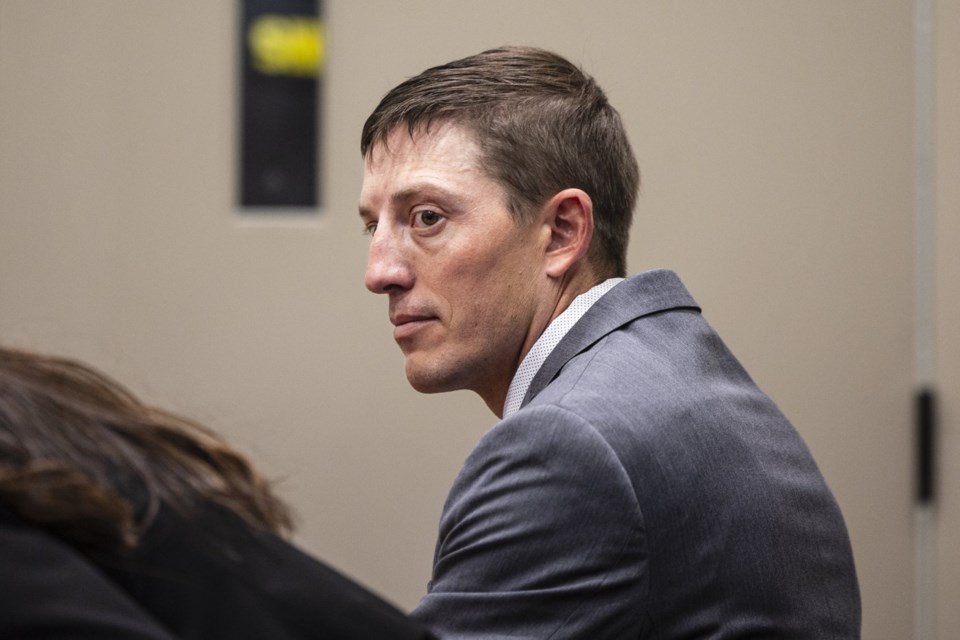GRAND RAPIDS, Mich. (AP) — A judge declared a mistrial Thursday after a Michigan jury couldn’t reach a unanimous verdict in the second-degree murder trial of a police officer who shot Patrick Lyoya, a Black man, in the back of the head .
The result came at the start of the fourth day of deliberations and was a partial victory for Christopher Schurr, who still could face another trial. The killing of Lyoya, a Congolese immigrant and father of two, sparked weeks of in Grand Rapids, especially after the city’s police chief released video of the confrontation.
“We thought we put a good case forward. Obviously the jury thought differently,” Kent County prosecutor Chris Becker told reporters.
The mistrial came a day after three former Memphis police officers in the beating death of after a traffic stop. His death more than two years ago was the first post-George Floyd case that of an unprecedented reckoning over police reform and racial injustice in Black America.
Schurr shot Lyoya while on top of the 26-year-old, who was laying . Schurr told jurors he feared for his life after losing control of his Taser during an intense struggle in a residential neighborhood.
Videos were a key part of trial and were repeatedly shown to the jury, including critical images recorded by a passenger in the car. The struggle with the Taser, which fires electrically charged probes, was central to Schurr’s defense.
The 34-year-old former officer stared straight ahead as the mistrial was declared. One spectator sitting near the Lyoya family loudly objected to the result as he left the courtroom. Few members of the general public were present compared to earlier in the trial.
Judge Christina Mims had urged the jurors to keep working after they said Tuesday that they were struggling to reach a consensus. Besides murder, they also could consider a lesser charge of manslaughter.
“Thank you for your time,” Mims said as she ended the trial.
The prosecutor said he would need more time before deciding whether to pursue a second trial.
“I don't bow to public pressure,” Becker said.
The shooting happened on April 4, 2022, when Schurr stopped for improper license plates and requested Lyoya's driver’s license.
showed Lyoya running and the officer tackling him. They struggled and the officer wasn't able to subdue Lyoya using the Taser, which Lyoya was then able to grab. Schurr repeatedly demanded he stop resisting and drop the Taser, then fired one bullet into his head.
Schurr testified he was “running on fumes” after the fight and in great fear because a Taser can cause “excruciating pain.”
“I believed that if I hadn’t done it at that time, I wasn’t going to go home,” Schurr said of shooting Lyoya.
The prosecutor, however, argued that the Taser had already been deployed twice by Schurr and could only be used in a different mode if Lyoya had decided to turn it against the officer.
It’s not known why Lyoya was trying to flee. Records show his driver’s license was revoked at the time and there was an arrest warrant for him in a domestic violence case, though Schurr didn’t know it. An autopsy revealed his blood-alcohol level was three times above the legal limit for driving.
Besides Schurr’s account of that day, jurors heard from witnesses who were described as experts in the use of force. Some were Schurr's fellow officers at the Grand Rapids department who supported him.
Experts called by defense lawyers said the decision to use deadly force was justified because the exhausted officer could have been seriously injured if Lyoya had used the Taser. The prosecutor’s experts, however, said Schurr had other choices, including simply letting the driver run.
Schurr, a seven-year veteran of the police department, was fired shortly after he was charged.
Lyoya’s family has said they came to the U.S. to escape prolonged civil unrest in mineral-rich eastern Congo. Lyoya ultimately joined a list of other Black immigrants who sought better lives in the U.S. only to suffer abuse or death at the hands of law enforcement, including , and .
___
White reported from Detroit.
Isabella Volmert And Ed White, The Associated Press



